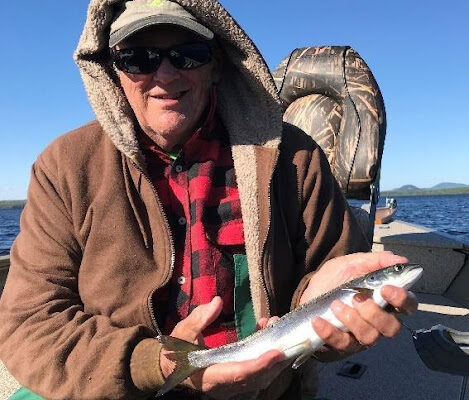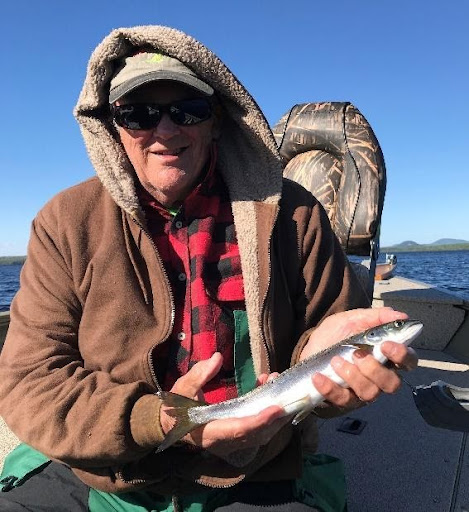
Fishing with a game warden, even if he’s a good friend, isn’t always easy
By Leighton Wass
I’ll never forget my first view of Moosehead Lake as a youngster when topping the hill on Route 15 in Greenville. It was love at first sight, the same feeling I experienced last May as Sean Fowler and I viewed Moosehead from that same hill. We were headed to Maynard’s on the Moose River for a comfy cabin, great meals and lots of fishing.
We had hoped to fish both the river and broad lake, but a recent round of days in the high 80s had put the kibosh on the river fishing.
Light winds produced perfect conditions for our first full day of plying the magnificent lake’s shoreline for our target species, wild brook trout (squaretails). Our plan was to pound the rocks and reefs in water from 10-20 feet deep while trolling streamers, using fly rods and sinking fly lines.
It didn’t take much time zigging and zagging around the boulder-studded shoreline to boat our first brookie, a minuscule 10.5-incher, and lose another at the boat of around 15 inches. With little wind, we could easily spot the brook trout’s favored haunts.
“Holy crap! I just saw a huge squaretail near bottom,” said Sean, who was standing, while passing over one such spot.

FISHING MOOSEHEAD – Moosehead Lake landlocked salmon caught on streamers are a barrel of fun, no matter the size. In this May 2021 photo, Bangor Daily News outdoors contributor Leighton Wass tries to smile despite the cold northwest wind.
Despite repeated passes over the reef, we produced nothing but boulder hook-ups.
Later that day we trolled for salmon near that gigantic rock in the lake called Kineo. Sean hooked into a nice salmon on a Gray Ghost streamer, and at a robust 19 inches, the salmon was a fitting end to our first day.
The following day emerged once more with ideal weather for fishing Moosehead, but the old-timer (me) decided to sleep in. Sean, a Vermont game warden lieutenant, headed onto the lake at 4:45 a.m.
Right off, he had a bruiser of a fish on but lost it halfway to the boat. We both believe that this bull-dogging fish was no doubt one of Moosehead’s giant squaretails. Damn.
Later, Sean picked me up and we elected to fish a new shoreline. The sleep-in guy nailed a 13-inch brookie using a smelt-like streamer over the stern, but his fishing partner then put on a fish-catching demo. Sean hooked two small salmon and two decent togue on the backside of Kineo, all on streamers.
Moosehead was not nice to us on day three. It was cold and very windy out of the northwest. We bucked the waves in my 15-foot Crestliner, but it was a wasted day in terms of fish and fishing enjoyment.
Day four was our last chance to prove that we knew something about fishing and, as it turned out, was our most memorable. Soon after we got our lines in the water, a male hummingbird said hello inches away from both our faces (It’s not always about the fishing).
After a luckless morning, we found a beach on Farm Island that was in the sun but out of the wind that provided the perfect place for lunch. After that respite, we decided to troll that leeward side of the island, zigzagging from deep to shallow water.
This was the day for old-timer Wass to show his stuff by hooking two salmon and the fish of the trip, a gorgeous male squaretail. But first, rewind to the previous evening in our cabin, where warden Sean and I had a rather contentious discussion.
What if one of us lands a brook trout that must be released? Can we take a picture of it? The lawbook for Moosehead Lake reads, “trout 18-22 inches long must be released alive and at once.”
Lt. Fowler interpreted it literally, that is, no time should be used to weigh or photograph the trout. I took the lower road and thought that a quick photo would be OK. We retired that evening in full disagreement.
Wouldn’t you know, the day after that discussion, the chance to “test” the law arose?
A short 20 minutes after losing a fine salmon on our last day, on a no-name streamer that I had tied and never used, I hooked the trout — on the very same fly. The fish peeled out most of my fly line, and thrashed a bit on the surface, but did not jump like a salmon.
We suspected brook trout or possibly togue until we saw the white-edged fins when it got close to the boat. Squaretail! Sean netted the fish for me, but even if the trout was of legal length I had no plans to keep it — but I just had to briefly measure it.
The Vermont warden now had steam coming out of his ears, and as he laid down the net and retreated to his seat said, in no unmistakable terms, “YOU ARE ON YOUR OWN!”
I lifted the handsome trout with both hands, a “picture” I will carry with me for the rest of my life and then, out of respect for my friend, elected not to take a photo and slipped the brookie overboard. The trout measured 18 1/2 inches and seemed as broad as a chunk of firewood. We estimated its weight to be somewhat over three pounds.
In retrospect, since I wasn’t planning to keep the trout, I didn’t need to measure it, and the warden could have snapped a picture when the fish was released.
Oh, yes. That fly I tied now has a name. We call it the “Own-Your-Own Streamer.”
Wass grew up in Southwest Harbor and graduated from Norwich University with a B.S. in science education. He taught high school biology in Vermont for 33 years and also is a freelance writer. At 79, he continues to use the outdoors as his playground. Wass lives in Adamant, Vermont, with his wife Jane and two Labradors. He has a book coming out this spring, “Fly Fishing The Hex Hatch,” published by North Country Press.